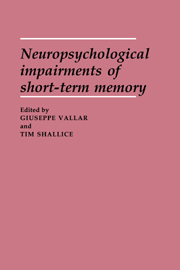Book contents
- Frontmatter
- Contents
- List of contributors
- Acknowledgments
- General introduction
- I THE FUNCTIONAL ARCHITECTURE OF AUDITORY–VERBAL (PHONOLOGICAL) SHORT-TERM MEMORY AND ITS NEURAL CORRELATES
- II PHONOLOGICAL SHORT-TERM MEMORY AND OTHER LEVELS OF INFORMATION PROCESSING: STUDIES IN BRAIN-DAMAGED PATIENTS WITH DEFECTIVE PHONOLOGICAL MEMORY
- 5 Auditory and lexical information sources in immediate recall: evidence from a patient with deficit to the phonological short-term store
- 6 Neuropsychological evidence for lexical involvement in short-term memory
- 7 Auditory–verbal span of apprehension: a phenomenon in search of a function?
- 8 Short-term retention without short-term memory
- III SHORT-TERM MEMORY STUDIES IN DIFFERENT POPULATIONS (CHILDREN, ELDERLY, AMNESICS) AND OF DIFFERENT SHORT-TERM MEMORY SYSTEMS
- IV PHONOLOGICAL SHORT-TERM MEMORY AND SENTENCE COMPREHENSION
- Name index
- Subject index
6 - Neuropsychological evidence for lexical involvement in short-term memory
Published online by Cambridge University Press: 11 May 2010
- Frontmatter
- Contents
- List of contributors
- Acknowledgments
- General introduction
- I THE FUNCTIONAL ARCHITECTURE OF AUDITORY–VERBAL (PHONOLOGICAL) SHORT-TERM MEMORY AND ITS NEURAL CORRELATES
- II PHONOLOGICAL SHORT-TERM MEMORY AND OTHER LEVELS OF INFORMATION PROCESSING: STUDIES IN BRAIN-DAMAGED PATIENTS WITH DEFECTIVE PHONOLOGICAL MEMORY
- 5 Auditory and lexical information sources in immediate recall: evidence from a patient with deficit to the phonological short-term store
- 6 Neuropsychological evidence for lexical involvement in short-term memory
- 7 Auditory–verbal span of apprehension: a phenomenon in search of a function?
- 8 Short-term retention without short-term memory
- III SHORT-TERM MEMORY STUDIES IN DIFFERENT POPULATIONS (CHILDREN, ELDERLY, AMNESICS) AND OF DIFFERENT SHORT-TERM MEMORY SYSTEMS
- IV PHONOLOGICAL SHORT-TERM MEMORY AND SENTENCE COMPREHENSION
- Name index
- Subject index
Summary
Introduction
According to the standard approach to short-term memory (STM), set forth by Baddeley in chapter 2, verbal STM depends on a phonological store of limited capacity. It is not clear, however, how this capacity is to be defined. Thus, if we take span (number of items recalled in correct order) to be our index of STM capacity, it is necessary to deal with the fact that this number does not represent some fixed quantity. Rather, it varies substantially across material type: span for digits (7.98) is greater than span for familiar words (5.86), which is in turn greater than span for nonword materials (2.49) (Brener, 1940). Various manipulations also affect span for words and nonwords differently: Performance on word lists is more resistant to suffix effects (Salter, Springer, & Bolton, 1976), and less affected by such factors as presentation modality and phonemic similarity (Richardson, 1979). Lexicality is evidently a sustaining factor in STM.
There has been little attempt to deal with these lexical influences, however, either from a theoretical perspective or as a matter for empirical study. Far from their being a focus of attention in STM research, experimenters have tended to minimize the effects of lexical variables by relying on digit materials or, when using words as stimuli, by sampling from a restricted item pool. It has sometimes been acknowledged that the information in the phonological store is “postexical,” the implication being that the information represented in this store consists of phonological units filtered through the lexical system (e.g., Richardson, 1979).
- Type
- Chapter
- Information
- Neuropsychological Impairments of Short-Term Memory , pp. 145 - 166Publisher: Cambridge University PressPrint publication year: 1990
- 13
- Cited by



